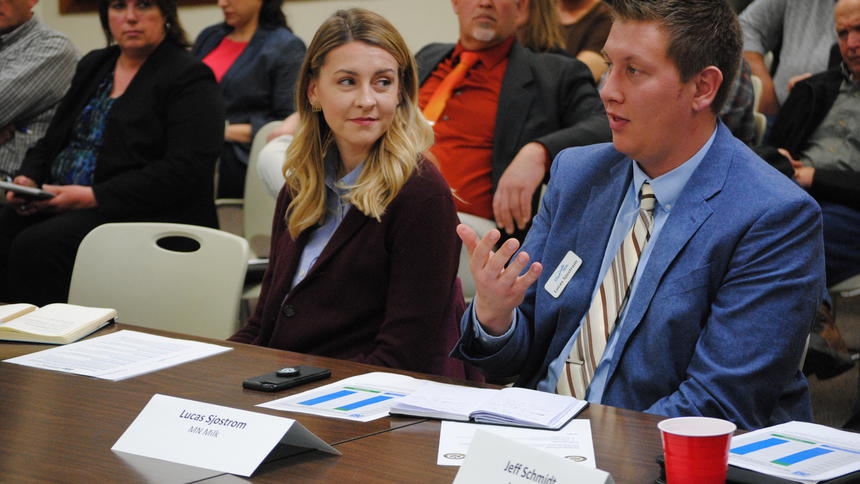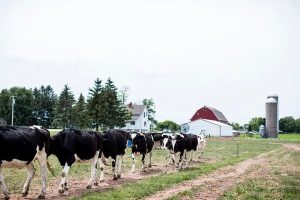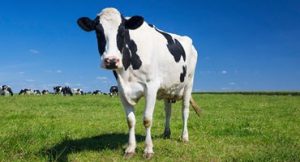
It can’t come soon enough, according to about two dozen ag lenders and representatives of dairy industries who met Friday in Litchfield with U.S. Senator Tina Smith and U.S. Rep. Collin Peterson.
They are trying to get the word out about the new Dairy Margin Coverage program and how it works. They are urging the United States Department of Agriculture Farm Service Agency to speed up its implementation and make information available to dairy producers on it.
The Dairy Margin Coverage program will allow producers to purchase insurance to protect their annual gross revenue on the marketing of up to 5 million pounds of milk, or about $900,000 a year. It’s targeted for dairies with fewer than 220 cows.
The Farm Service Agency is hoping it will be able to offer the program beginning in June, Joe Martin, head of the FSA in Minnesota, told the group on Friday. However, he said the local offices cannot provide producers with information on the program until the federal office provides it.
“What gets you from here to July?” is the question posed by Mary Neil Priesler, of the Minnesota Farm Lender Mediation program. She was among those who described the financial struggles facing small dairies.
“A very dire situation,” said Keith Olander, of the Minnesota Farm Business Management Program. He told the elected officials that dairy farmers are essentially “paralyzed,” and having a difficult time making decisions due to the financial stress.
Dairy producers have experienced their second worst year of the past 60 years in terms of financial performance, he said.
Dairy producers have struggled financially through four consecutive years, Lucas Sjostrom, CEO of American Milk Producers, told the elected officials.
Minnesota lost 10 percent of its dairies in 2018, according to information provided at the meeting. Lenders said some of their most financially astute producers are choosing to liquidate while they still have some equity.
The financial stress is taking a human toll. Harlan Helgren, with Frandsen Bank and Trust, of Fairfax, urged the elected officials not to forget the mental health needs of struggling producers.
Steve Zenk, of the Minnesota Farm Advocates program of the state Department of Agriculture, said he is receiving calls from producers who are experiencing great stress. He said one producer told him: “I cry every time I go out to the barn.”
The lenders told Smith and Peterson that producers are aware of the Dairy Margin Coverage program. They believe virtually all of their clients will buy the insurance, and that it will help them.
They do not necessarily expect it to resolve the long-standing issues of over-supply and low milk prices.
“We appreciate the program, but it’s definitely not the game changer,” said Curtis Gerrits, Investors Community Bank.
“What I am trying to do is keep the small guys in business,” said Peterson of the program.
Peterson said one of his main concerns is that producers will not use the program in ways that will benefit them the most. He is recommending that they purchase the full protection for a locked-in period of five years. In that way, they will have the certainty of the gross revenues needed to keep them at a break-even point.
He also pointed out that the insurance will be retroactive to the start of the year. Producers buying insurance in June will know that they will be receiving payments to make up the margins they already lost in the first months of the year.
Peterson, chairman of the U.S. House Agriculture Committee, said he will be working to keep the insurance program in place for the long term.
He told the meeting participants Friday that he is concerned about the overall health of the agricultural economy. “We’re one year away from having a discussion like this with crop farmers,” said the congressman as the listening session neared its end.
Sen. Smith told reporters after the session that she came to it well-aware of the dire situation in dairy. “I didn’t hear anything to change my mind on that,” she said.
The senator said that she believes the new Dairy Margin Coverage program will help and she was glad to hear that both bankers and dairy farmers see that as well.

























